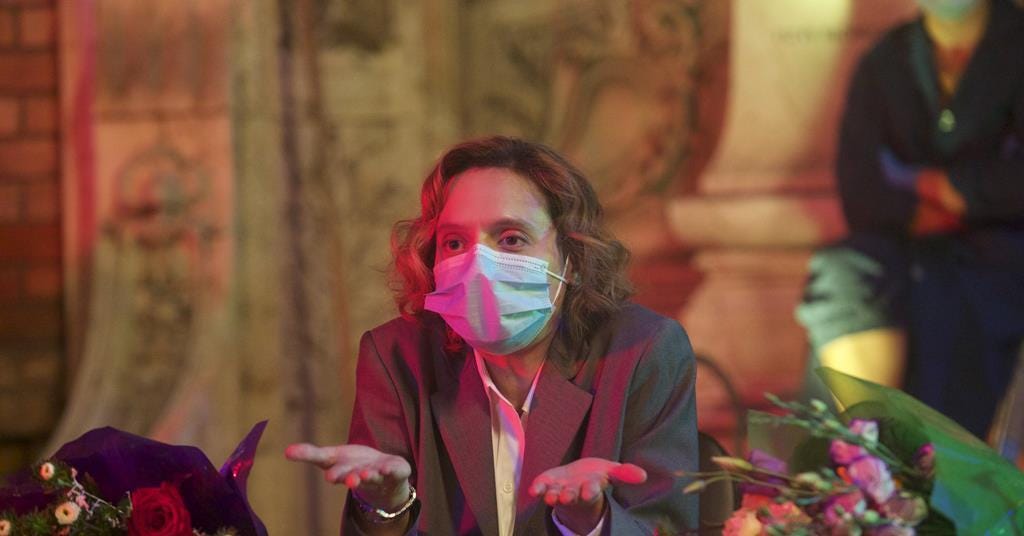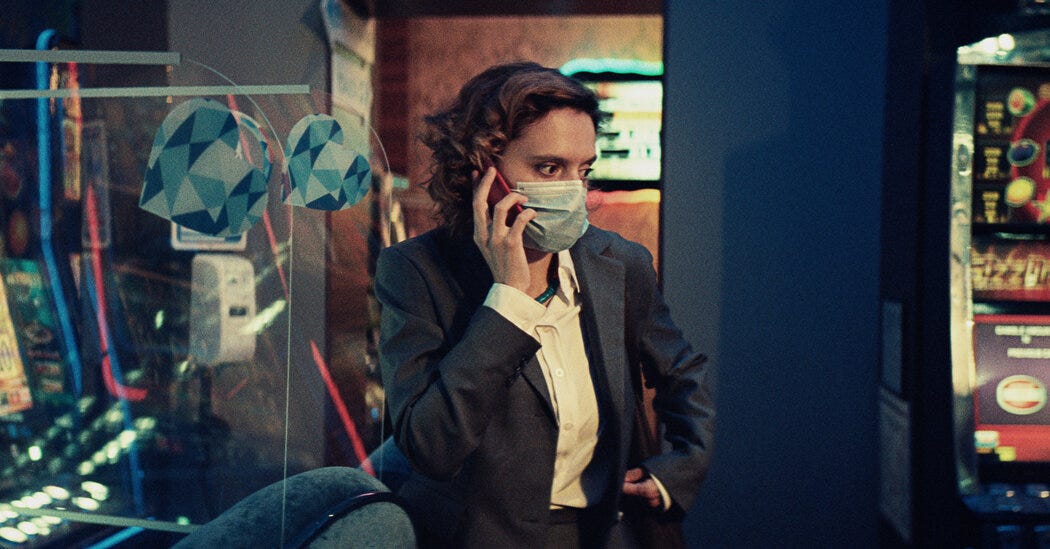When The Best Film About America Is Romanian
The Romanian firecracker 'Bad Luck Banging,' now on video, had more to say about pandemic-era America than any American film last year.
Last weekend, I finally caught up with the Steven Soderbergh’s Kimi, one of the most exhilarating 90 minutes I’ve had with a new movie in a long time. (Not to be dogmatic about running times—some films require more space than others—but there’s nothing like a no-fat thriller from a master director.) One reason it exhilarates is that it takes place in the world we actually live in, the one muddling through the generational trauma of a pandemic that’s upended labor, politics, education, socialization, and nearly every other aspect of American life. Though the pandemic does figure into its plot about an agoraphobic tech who thinks she hears a violent crime on an audio stream, its role here is mostly about situating her story in the context of contemporary life. Over two years into this now, we should be seeing this all the time in the movies, even in something like Marry Me, which is pointedly plugged-in to social media and pop culture, yet takes place on the COVID-free Planet Rom-Com, where celebrities get hitched in front of thousands of maskless fans.
The pandemic isn’t an isolated example of filmmakers ignoring the elephant in the room—see also: my essay on Restrepo, one of the few essential works to come out of a 20-year war in Afghanistan—but Kimi proves how much easier COVID can be to work into a film than, say, 9/11 or school shootings, because it’s so woven into the fabric everyday life It reminded me of a quote from Radu Jude’s Bad Luck Banging or Loony Porn, the Romanian firecracker that was tossed in our laps last year. In its extraordinary second act, Jude runs down a list of his own “dictionary” definitions of contentious terms, presented as individual micro-shorts, most with acidic political commentary and a few with dirty jokes. When he gets to “Cinema,” he references the slaying of Medusa by Perseus, who knew that to see her face would turn him to stone, so he only looked at her through her reflection on the shield of the goddess Athena. Here’s the quote:
“The moral is that we do not, and cannot, see actual horrors because they paralyze us with blinding fear and that we shall know what they look like only by watching images which reproduce their appearance. The cinema screen is Athena’s polished shield.”
Athena’s polished shield isn’t showing us nearly enough, at least not yet. And so Bad Luck Banging, the story of a persecuted teacher in Bucharest in the COVID era, had more to say about America than any American film that’s been made since the pandemic started. It would take only minor tweaks to that second act (and a few scattered references) to make an English-language Bad Luck Banging for the States. Attitudes about sex, history, schooling, and even masking requirements are echoed between the countries, and Jude’s depiction of a society coming apart at the seams feels eerily on the nose. As reflected by his shield, his Medusa’s not different than ours.
The Reveal is a reader-supported newsletter dedicated to bringing you great essays, reviews and conversation about movies (and a little TV). While both free and paid subscriptions are available, please consider a paid subscription to support our long-term sustainability.
One element that may not survive American translation is the unsimulated “loony porn” that opens the film, a sex tape between Emi (Katia Pascariu) and her husband Eugen that inadvertently gets uploaded to the internet. (Eugen never appears on screen in the tape or in the film, one of the pointed ways Jude suggests that a woman’s sexuality is judged more harshly than a man’s.) The clip goes viral enough to find its way onto the laptops and tablets of Concerned Parents at the prestigious secondary school where Emi teaches history. The headmistress calls for an outdoor, socially distanced meeting to discuss Emi’s future at the school, which is in serious jeopardy.
But Jude takes his time getting there. The first of the film’s three discrete acts is as much a document of pandemic-era Bucharest as it is about Emi’s sex tape and trial-by-PTA. Jude follows her around the city as she gets updates about the tape’s spread through Pornhub and blogs—a viral event in the midst of a real-world viral event. She meets briefly with the headmistress, but his camera looks around and sometimes stops cold, as if taking visual notes. An early wide shot of Emi picking through a market doubles as a survey of mask-wearing: Most are fully masked, as required, but a few have them under their noses or tucked beneath their chins altogether, in defiance of a presumed mandate.
Meanwhile, tensions run hot. In a checkout line, a poor woman gets screamed at for taking too much time pulling out items she cannot afford to buy, holding up the people behind her. On the streets, one driver calls Emi all sorts of filthy names when she objects to him parking in the road, and another climbs out of a comically large jeep stopped right in the middle of the crosswalk. The prelude to Emi’s meeting with parents is an atmosphere of palpable hostility, where people who may have felt cooped up (or worse) by pandemic restrictions are in open revolt. Or perhaps they’ve just forgotten how to behave in public. Little in this first act moves the story forward, but these are precious images of what it’s like to live in contemporary Bucharest, a reminder that all fiction films are partly documentaries (and the other way around).
But Jude isn’t done setting context. The second part of Bad Luck Banging, called “a short dictionary of anecdotes, signs and wonders,” runs through an A-Z list of various terms, with a heavy focus on respected institutions that Jude understands as vile and corrupt. Under “church,” for example, the film notes that the Romanian Orthodox Church has been close to all dictatorships while always enjoying broad public support, showing us a bishop sitting smugly as nuns sing a song called “O Holy Fascist Youth.” For “Christmas,” the film highlights 3,000 Jews and Roma who were rushed to execution during World War II so Romanian troops could come home to “celebrate Christ’s birth.” Other definitions are more in the here-and-now, like “social distancing,” which is a clip of three older men mocking the COVID crisis by holding the ends of 1.5 meter poles and dancing in a circle.
Part three finally gets to the big event, where Emi sits masked-up in front of her accusers, who kick off the evening by holding up a tablet and making sure everyone sees the notorious sex tape. Emi’s defense is sound: She and her husband are consenting adults, the tape is private, and it’s nobody else’s business. The prosecution is all about the place: Emi is defiling the school. She won’t have the respect of her students. She isn’t making love to her husband but “cocksucking.” Among the diverse array of dimwits is a “progressive intellectual” who once said “all women are sluts”; several mothers who threaten to pull their kids out of school if she stays; two military men, including one who talks of a “pandemic dictatorship” and calls masks “the muzzle of slaves”; and a smattering of supporters of Emi’s cause, like a guy wearing an “I Can’t Breathe” mask.
The digressions in this forum that’s ostensibly about Emi’s fitness as a teacher are telling for two reasons. First are the persistently regressive attitudes toward women, with so many sounding off about how Emi’s behind-closed-doors behavior is unbecoming of a woman of her age. (A pervy man counters: “We must see this to the happy end. It’s revolting!”) The other is the sticky issue of history itself and what Emi should be teaching her class. One parent doesn’t want her to “indoctrinate” kids with stories about Romania’s role in the Holocaust, and another decries “the filthy Jewish propaganda” that denies his belief that Hitler and his camp commanders were all Jews.
A school meeting where parents yell at educators about mask mandates and want certain uncomfortable truths about the country left out of history class? Sounding a bit familiar, right? While there are some global commonalities in how various political factions have responded to pandemic restrictions, the specific echoes between the Romania of Bad Luck Banging and America over the past two years have a disturbing resonance, particularly given the many times Jude’s film accuses his home country of being on the wrong side of history. Yet it’s hard not to feel a little jealous of Romania for having a filmmaker who’s willing to engage with such dramatic change in the moment, capturing lightning in a bottle. The best film about America in 2020-2021 should not have to be imported.
Bad Luck Banging is now available on the usual platforms and will be on Hulu March 17th. My mom and dad, who read this newsletter every day, are advised not to watch it.







Worth noting: Hulu and Amazon Prime use the "censorship" edit of the film, which I guess Jude was forced into making? The censor titles tease a new film from him explaining why they're included. But for the most part they cover the filming of the sex tape, replays of it and the "third ending." Apple Store offers both versions of the film for rent/purchase.
Saw this in a semi-full room at the Film Forum back in December. Found an old lady on Letterboxd who was also at that screening who excitedly declared "Never thought I would experience ACTUAL porn in a theater at Film Forum but I guess the title did warn!!!" and then gave it four stars. She is now my favorite follow on the site. So who says social media has no upside.